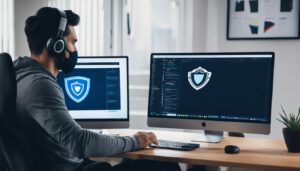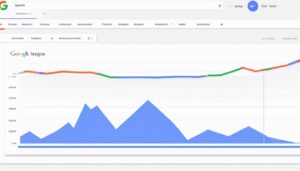This blog post contains affiliate links, and we may receive a commission for purchases made through these links at no additional cost to you.
In today’s digital age, ensuring the security of your online activities is more important than ever. With the increasing prevalence of data breaches and cyberattacks, protecting your personal information and privacy should be a top priority. By implementing effective internet security measures, you can safeguard your online life and enjoy peace of mind while browsing, shopping, and communicating online.
When it comes to internet security, there are several key areas to focus on. From protecting your data to securing your network and maintaining online privacy, taking proactive steps can significantly reduce the risk of falling victim to online threats.
Here are some essential aspects of internet security that you should be aware of:
1. Data Protection: Safeguarding your personal and sensitive information is crucial. By using strong passwords, encrypting your data, and being cautious of sharing sensitive information online, you can minimize the risk of unauthorized access and data breaches.
2. Network Security: Securing your network is vital to prevent unauthorized access to your devices and information. Utilize firewalls, enable network encryption, and keep your router’s firmware updated to enhance your network’s security.
3. Online Privacy: Maintaining your online privacy is essential to protect your personal information from being misused or disclosed without your consent. Review and adjust privacy settings on social media platforms, use virtual private networks (VPNs) to encrypt your internet connection, and be cautious of the information you share online.
4. Cybersecurity: Staying informed about the latest cybersecurity threats and best practices is crucial. Regularly update your software and devices, be cautious of phishing attempts, and educate yourself about common online scams and tactics used by cybercriminals.
By incorporating these internet security measures into your online routine, you can minimize the risk of falling victim to cyberattacks and data breaches, safeguarding your online life and personal information.
Key Takeaways:
- Protect your personal information and privacy by implementing internet security measures.
- Focus on data protection, network security, online privacy, and cybersecurity.
- Use strong passwords, encryption, and be cautious of sharing sensitive information.
- Secure your network with firewalls and updated firmware.
- Maintain online privacy through privacy settings and VPNs.
- Stay informed about the latest cybersecurity threats and best practices.
Understanding Online Privacy and Internet Security
Online privacy and internet security are two critical aspects of maintaining a safe and secure digital presence. While online privacy focuses on keeping personal information confidential, internet security involves protecting accounts and data from online threats such as hackers and cyberattacks.
These two concepts, online privacy and internet security, go hand in hand. By implementing robust security practices, you enhance your online privacy and safeguard your personal information. Unfortunately, not all tech companies and online services prioritize consumer privacy, resulting in data breaches and misuse of personal data.
To effectively protect your personal information online, it is crucial to understand the relationship between online privacy and internet security. By taking the necessary precautions and adopting best practices, you can mitigate the risk of data breaches and unauthorized access to your personal data.
Implementing strong passwords, enabling two-factor authentication, and regularly updating software and applications are some of the essential steps you can take to enhance your internet security. Additionally, staying informed about the latest cybersecurity threats, such as phishing scams and malware attacks, is crucial for maintaining your online privacy.
“Online privacy and internet security go hand in hand. By implementing robust security practices, you enhance your online privacy and safeguard your personal information.”
Protecting your personal data is an ongoing process that requires constant vigilance. However, by understanding the importance of online privacy and internet security, and by implementing the necessary measures, you can significantly reduce the risk of data breaches and protect your personal information from unauthorized access.
Tips for Enhancing Online Privacy and Internet Security:
- Use strong and unique passwords for each online account.
- Enable two-factor authentication for an extra layer of security.
- Regularly update software and applications to patch security vulnerabilities.
- Be cautious of phishing scams and suspicious email attachments.
- Limit the amount of personal information you share online.
- Regularly review and adjust privacy settings on social media platforms.
- Consider using a virtual private network (VPN) for secure browsing.
- Encrypt sensitive data to protect it from unauthorized access.
By following these tips and staying informed about the latest cybersecurity threats, you can strengthen your online privacy and improve your internet security. Remember, protecting your personal data is paramount in today’s digital world.
| Online Privacy | Internet Security |
|---|---|
| Refers to the ability to keep personal information private. | Focuses on protecting accounts and data from hackers and cyberattacks. |
| Includes steps such as limiting data sharing and adjusting privacy settings. | Includes measures like strong passwords, two-factor authentication, and software updates. |
| Relies on individuals’ choices and actions to maintain privacy. | Requires proactive measures to prevent unauthorized access and data breaches. |
Tips to Protect Your Privacy and Personal Information Online
To protect your online privacy and personal information, it is essential to take proactive measures. By following these tips, you can significantly enhance your data protection, safeguard your privacy, and reduce the risk of unauthorized access to your sensitive data.
1. Share Less Information: Be cautious about the amount of information you share with apps and online services. Only provide necessary details and avoid disclosing personal information that may compromise your privacy.
2. Strong and Unique Passwords: Use password security best practices to create strong, unique passwords for each of your accounts. Combine uppercase and lowercase letters, numbers, and special characters. Additionally, consider implementing two-factor authentication for an extra layer of security.
3. Tighten Privacy Settings: Review and adjust privacy settings on your social media accounts and other online platforms. Limit the amount of information that is visible to the public or even to your connections. Regularly review and update these settings to ensure your personal information remains protected.
4. Delete Unused Accounts and Browser Extensions: Unused accounts and browser extensions can pose potential security risks. Take the time to delete any accounts or extensions that you no longer use. This reduces the likelihood of your personal information being exposed in case of a data breach.
5. Use a VPN for Added Security: A VPN (Virtual Private Network) is an excellent tool to enhance your online privacy and protect your data. It encrypts your internet connection, making it difficult for others to intercept your browsing activity. Use a trusted VPN service to ensure your data remains secure.
6. Employ Encryption: Encryption is another powerful tool to safeguard your personal information. Use applications and services that offer end-to-end encryption, ensuring that your data is only accessible to authorized parties. This adds an extra layer of protection against unauthorized access.
7. Monitor Sensitive Information: Regularly monitor your sensitive information, such as credit card statements and bank accounts. Consider enrolling in an identity theft protection service that can notify you of any suspicious activity related to your personal information.
8. Revoke Unnecessary Third-Party App Connections: Review the list of third-party apps connected to your accounts and revoke access for any apps you no longer use or trust. This reduces the potential risk of your personal information being accessed through these apps.
By implementing these measures, you can significantly improve your online privacy and protect your personal information from potential threats. Remember to stay vigilant and regularly review and update your security practices to ensure you remain protected in an ever-evolving digital landscape.
“Your personal information is a valuable asset. Take the necessary steps to protect it from unauthorized access and potential misuse.”
Comparison of VPN Services
| VPN Service | Features | Price |
|---|---|---|
| ExpressVPN | Fast connections, extensive server network, strong encryption | $12.95/month |
| NordVPN | Double VPN, strict no-logs policy, DNS leak protection | $11.95/month |
| Surfshark | Unlimited device connections, ad and malware blocker | $12.95/month |
Safeguarding Your Online Life with Internet Security Tools
Utilizing various internet security tools can significantly enhance your online safety. It’s crucial to stay one step ahead of cyber threats with a robust defense system. By employing the right security tools, you can protect yourself from malware, secure your accounts, and ensure your online privacy.
Antivirus Software
Installing and regularly updating antivirus software is a fundamental step in protecting your devices from malware and other online threats. Antivirus software scans, detects, and removes malicious software and files from your computer, safeguarding your data and privacy. We recommend well-established antivirus solutions such as McAfee, Norton, and Avast.
Password Managers
Using strong and unique passwords for every online account is essential, but it can be challenging to remember them all. Password managers provide a convenient and secure solution by generating strong passwords and securely storing them. Popular password managers like LastPass, Dashlane, and 1Password encrypt your passwords and offer features like automated login and form filling.
Virtual Private Network (VPN)
A VPN encrypts your internet connection, adding an extra layer of security when you browse the web, access sensitive information, or connect to public Wi-Fi networks. It masks your IP address and encrypts your data, making it difficult for hackers or government agencies to monitor your online activities. NordVPN, ExpressVPN, and CyberGhost are popular VPN services renowned for their reliability and advanced security features.
Multi-Factor Authentication
Implementing multi-factor authentication (MFA) adds an extra layer of security to your online accounts. MFA requires you to provide multiple forms of verification, such as a password and a unique code sent to your mobile device, before granting access. This ensures that even if your password is compromised, unauthorized access is thwarted. Many popular online services, including Google, Facebook, and Microsoft, offer MFA options to enhance account security.
To maximize your online protection, it’s important to leverage a combination of these security tools and take proactive measures. By utilizing antivirus software, password managers, VPNs, and multi-factor authentication, you can fortify your defenses against cyber threats and enjoy a safer online experience.
Staying Informed About Online Privacy Threats
In today’s digital landscape, staying informed about the latest online privacy threats is crucial to effectively protect yourself and your personal information. From frequent data breaches that impact various institutions to the ever-evolving landscape of online threats, being aware of these risks is the first step in safeguarding your online privacy.
Data breaches are a significant concern, with sensitive information exposed on a regular basis. These breaches can have severe consequences, including identity theft and financial fraud. By staying informed about data breaches, you can take the necessary precautions to mitigate the risks and protect your personal data. It’s essential to regularly monitor news outlets, security blogs, and official announcements from organizations that may have experienced a breach.
Changing passwords regularly is another crucial step in response to data breaches. By updating your passwords for affected accounts, you can minimize the potential damage caused by a breach. Additionally, monitoring your financial accounts and credit reports for any suspicious activity can help detect and address any unauthorized access promptly.
Security updates play a vital role in protecting your devices from newly discovered vulnerabilities and online threats. Keeping your operating systems, applications, and antivirus software up to date ensures that you have the latest security patches and protection mechanisms in place. It’s recommended to enable automatic updates whenever possible to stay current with the latest security features.
Phishing scams are a prevalent online threat that can compromise your online privacy. These scams typically involve cybercriminals impersonating legitimate entities and tricking users into providing sensitive information. Staying informed about the latest phishing techniques and being cautious when opening emails or clicking on links can help you avoid falling victim to these scams. Always verify the legitimacy of the sender before sharing any personal or financial information.
By staying informed about data breaches, online threats, privacy risks, security updates, and phishing scams, you can actively protect your online privacy. Implementing best practices, such as changing passwords, staying up to date with security updates, and exercising caution when encountering suspicious emails or websites, will help ensure your personal information remains secure.
Remember, your online privacy is valuable, and it’s worth investing time and effort into staying informed and proactive in your security measures. Stay vigilant and prioritize your privacy to enjoy a safer online experience.
The Importance of Strong Passwords and Encryption
When it comes to protecting your online accounts and personal information, using strong passwords and encryption is fundamental. By implementing these security measures, you can significantly enhance your data security and safeguard your sensitive data from unauthorized access.
Strong Passwords: One of the first lines of defense against unauthorized access to your online accounts is to use strong passwords. Having unique and complex passwords for each account reduces the risk of one data breach leading to the compromise of multiple accounts. We recommend using a combination of uppercase and lowercase letters, numbers, and special characters to create strong passwords.
“Using a strong password is like putting a lock on the front door of your house. It makes it more challenging for intruders to gain access to your personal information.”
Password managers can be incredibly helpful in generating and securely storing unique passwords for all your accounts. These tools alleviate the burden of remembering multiple passwords and ensure that your passwords are strong, randomized, and off-limits to hackers.

Encryption: Encryption adds an extra layer of protection to your data by scrambling it, making it unreadable to anyone without the decryption key. Whether it’s the data stored on your devices or the information transmitted over the internet, encryption ensures that even if intercepted, the data remains secure and inaccessible to unauthorized individuals.
Implementing encryption protocols, such as SSL/TLS for secure web browsing or using encrypted messaging services, can effectively safeguard your personal information. It’s essential to prioritize encryption when choosing online services, ensuring that your data remains protected at all times.
Remember, strong passwords and encryption measures significantly contribute to data security, minimizing the risk of data breaches and unauthorized access to your personal information online.
Conclusion
Safeguarding your online life with robust internet security measures is of utmost importance in today’s digital age. As the number of data breaches and privacy risks continues to rise, it is crucial to take proactive steps to protect your personal information.
By employing strong passwords, staying informed about online threats, and leveraging security tools such as antivirus software and virtual private networks (VPNs), you can significantly enhance your online security and safeguard your data and privacy effectively. Adhering to privacy best practices, such as monitoring your accounts and being cautious of phishing scams, further fortifies your online defenses.
Remember, maintaining a safe online presence requires constant vigilance and staying up-to-date with the latest security measures. Regularly updating your software and implementing additional layers of protection, like multi-factor authentication, can help you stay one step ahead of cybercriminals and ensure the integrity of your personal information.
By prioritizing internet security, online privacy, and data protection, you can navigate the digital landscape with confidence, knowing that your online interactions are secure and your private information remains confidential.





